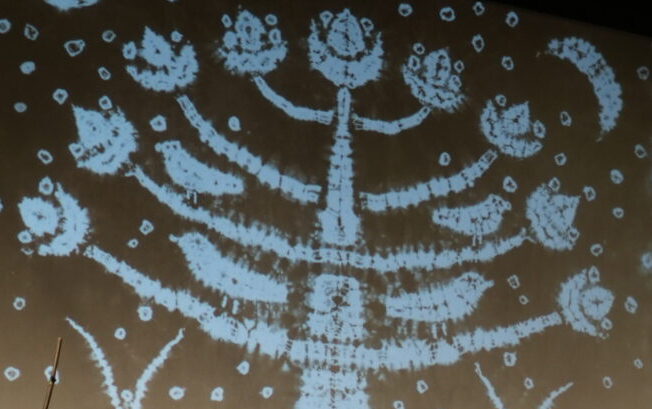Past, present, future… Roots, trunk, branches… Is this how we perceive ourselves and the common destiny of man and tree? A man is nothing without roots, and a tree without them is just a stick stuck in the ground. On the day of the restoration of the state of Lithuania, did we feel that we were, are and will be if we are invited to watch the story-legend “Roots” intertwined with the art of music, speech, song and acting in the “Minijos” cinema of the Gargžda Cultural Center, if we do not forget our beginning? And the beginning of each of us is the roots.
It started with an idea
Deep, meaningful, with lasting value, moved to tears, full of Lithuanianness, making you proud of your country and its people – this is how the participants and viewers described the story-fable “Roots” spoken, felt and sung in the Gargždas “Minijos” cinema on the day of the restoration of the state of Lithuania. . Colleagues did not spare words of gratitude to Kristina Kazlauskaitei-Kažukauskienei, director of events and theater of the Gargžda Cultural Center, who matured and implemented the idea of the event.
“The past inspires us, the present nourishes us, and the future gives us hope. It is the duty of each of us to respect our roots and pass that respect on to our children”, this is the idea that K. Kazlauskaitei-Kažukauskienei, the author, director and performer of the “Roots” script, was helped to convey on stage by the ethnic group of students of “Kranto” pro-gymnasium (leader Vitalija Valaiki), the vocal group “Bangeles” ” (director Rasa Linkienė), folklore ensemble “Kvėitys” of Wheat Department of Gargžda Cultural Center (director Regina Jokubaitytė), teachers of Gargžda Music School Marijus Sūdžius and Edita Bodrovaitė-Rukienė.
When drawing the parallel between a tree and a person, a nation, Kristina said she believed in her idea and was happy that she managed to defend it. “My colleagues were a little curious about how it would be this time, but they understood that I would not be able to explain, that I would be at a loss for words, so when they heard my traditional phrase “I have a feeling that it will be fine”, they left me alone. Thank you for trusting me,” smiled Kristina, who has accumulated 13 years of experience in creative work, and recently won the district’s “Cultural Person of the Year 2022” award and received a statuette, which, by the way, also depicts a tree.
When asked about the creative process, which remains invisible to the audience, the author of “Roots” and many other scripts admitted that the more complicated, the less time, the more she mobilizes herself, that writing is helped by silence and peace, that she has pictures in her mind of how everything will look. “And everything happens as if against my will – something seems to be sending me thoughts. I like mysticism, but I don’t advertise it much, I am attracted by secrets, the past, spirituality. If I could, probably most of the events I direct would be spiritual,” said Kristina, who also writes poetry.

Self-criticism makes you improve
Creating a text is only part of the scriptwriter’s job. To choose performers, music pieces, scenography, even the clothes of the participants, to feel how all this will fit together on stage, to learn the text helps Kristina… intuition and experience. “I’m very self-critical, I can’t judge my work until it’s done. There has never been an event of mine that I have completely enjoyed. And something should be changed in “Roots”, it is not perfect”, the experienced director and performer did not hide. Before the event, she said that she was nervous not about any technical things, but because she really wanted people to hear and feel what idea she wanted to convey.
“Today, we often hear that the past should be forgotten, let go. That it can no longer give us anything, and maybe even pulls us back, distances us from innovation and progress. People are looking for something else, something foreign… not themselves”, “Saknys” invited to take a deeper look at themselves. Kristina admitted that she is sad that her generation does not appreciate ethnoculture, is not proud of it, that it seems unfashionable. “Other nations do the opposite, what happened that we lost our roots?” asked the director rhetorically.
However, the ethnic team of “Kranto” pro-gymnasium, which prepared the program about the emergence of the city of Gargžda last year and showed it again on the Day of State Restoration, showed by its example that ethnoculture is still like its own shirt, which is always closer to the body. V. Valaikki, who inculcates ethnic culture in the students at the “Kranto” pro-gymnasium, said that it was an honor and responsibility for them to be participants in the event, so the parents of some children changed their plans so that their children could participate in the program.
“We felt some kind of mysterious aura, peace and sensitivity emanating from the hall, we saw how people reacted”, Vitalija had no doubts about the impact of words, songs and music. Although the young performers received praise, as true artists, according to the manager, they had self-reproaches and criticized their performance after the event.
“I believe it was an incredible experience for my children. I have the hope that every February 16th they will meet wearing the national costume, and I have a dream that one day all the people of Lithuania will decorate themselves with it during the major national holidays”, – shared the thoughts of the head of the ethno team, V. Valaiki.
“Roots” is a very exciting, deep, meaningful, unique event with lasting value. You left it and still live with the same thought for a long time. It is for every person’s heart: what we are going through today, where we are, what we should be and how we should respect, love and protect ourselves. It has been a long time since I participated in such an event. Most of the time, people are presented with what is popular today, without thinking, everything flows easily. You stayed, you left, and everything was forgotten – R. Jokubaitytė, head of “Kvėitis”, shared her thoughts when interviewed. – Ethnic culture is very important, so there should be a return to our roots, not annihilation. “Shaknis” could be repeated in commemoration of other public holidays as well.”
“A big oak grows from a small acorn. And Gargždai would have been a big prosperous city today, if not for repeated misfortunes. The price of living between two countries. On the threshold through which all historical disasters have constantly crossed. But our roots are deep, deeply embedded in the land of the land of the 4 waters. Cut down trunks have repeatedly grown back, burnt areas have become green again. The ruined city rose again and again from the ashes. You can cut down the tree once or twice, but if the roots are strong, the stump will turn green again next spring.
People are like trees. The city is like a tree. Most peoples believed that life itself is a tree. A great tree of life, in whose branches the future is wrapped, the trunk is our world, and the roots are in the deep Divine Antiquity. A man is nothing without his roots.”
Laima ŠVEISTRYTĖ
photo of Andrias JOKUBAIČIS.


